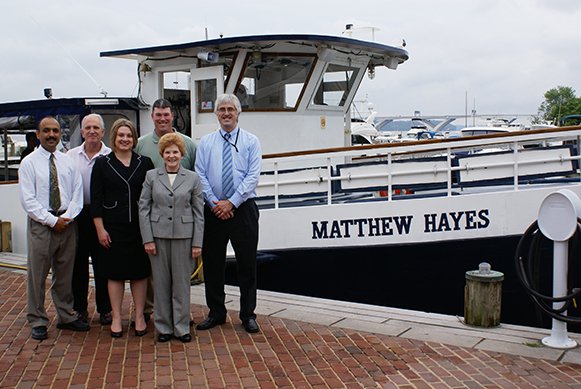Diesel engines especially older ones generate a lot of pollutants. That black smoke you see pumping out of trucks buses and boats produces major negative effects on human health the environment the climate and exacerbate environmental injustice.
To ameliorate these effects Congress passed the Diesel Emissions Reduction Act (DERA) in 2005. The legislation was reauthorized in 2010 and it provides up to $100 million a year to reduce emissions from diesel engines.
The legislation charges the U.S. Environmental Protection Agency (EPA) with managing the program and doling out the funding. Some of the funding is delivered to states based on a formula but a significant portion is distributed at the EPA Regional level based on a competitive process. Winning proposals are chosen based on overall emission reduction estimates and the Region’s priorities (metropolitan Washington is in EPA Region III).
 From left to right: Lalit Sharma (Office of Environmental Quality City of Alexandria) Willem Polak (Owner Potomac Riverboat Company) Jennifer Wilk (Passenger Vessel Association) Capt. John Lake (PRBC) Del Pepper (Alexandria Councilwoman) and Jeff King (Council of Governments)
From left to right: Lalit Sharma (Office of Environmental Quality City of Alexandria) Willem Polak (Owner Potomac Riverboat Company) Jennifer Wilk (Passenger Vessel Association) Capt. John Lake (PRBC) Del Pepper (Alexandria Councilwoman) and Jeff King (Council of Governments)
Reducing emissions from diesel engines in metropolitan Washington has been a priority for the Council of Governments for several years and in 2011 it was awarded grant funding under the competitive portion of DERA to replace older diesel engines on two vessels owned by the Potomac Riverboat Company in Old Town Alexandria. The project a partnership between the Council and the Passenger Vessel Association was completed in 2011 and the new engines are running on the company’s popular Old Town – Georgetown route.
According to Jeff King Principal Environmental Planner at the Council of Governments this project originated when he saw one of the Potomac Riverboat Company’s vessels leaving dock in Georgetown. He reached out to Willem Polak the company’s owner who thought it a wonderful idea to invest in cleaning up the fleet.
“As an elected official in the City of Alexandria and a longstanding supporter of environmental protection I was particularly pleased to see the Council of Governments partnering with a local small business to help make it more sustainable” said Del Pepper Alexandria City Councilwoman. “The Potomac is a major environmental and economic asset to this region and cleaning up our air and water will help it ensure it’s viable for generations to come.”
In addition to the obvious benefits to human health the environment and climate associated with reduced emissions the boat operators experienced several economic advantages from the engine replacements including savings on fuel lower cleaning and maintenance costs and more efficient operation.
A second boat engine replacement project emerged when the District of Columbia government contacted the Council of Governments requesting assistance in developing a project on which they could use their state-level DERA funding. Council staff partnering with the District government worked with the owners of the Spirit of Mount Vernon a large tour boat operating between D.C. and George Washington’s historic Mount Vernon estate to replace their engines with newer cleaner ones.
“When we were approached by the District Department of the Environment to assist with a project to reduce diesel emissions in the city we immediately saw a way to put a new project into action” said King. “Working with Gary Frommelt of Entertainment Cruises we were able to quickly line up the Spirit of Mount Vernon project and expeditiously handle the process to hire a shipyard to get the work done under a very tight time pressure. In the end the collaboration was a success.”
“When we reached out to the staff over at the Council of Governments they quickly jumped into action and came up with a great project said Cecily Beall Air Director for the D.C. Department of the Environment. “Now the 80000-100000 kids that the Spirit carries from the District to George Washington’s Mount Vernon are enjoying a trip with a much smaller carbon footprint and less exposure to harmful diesel exhaust.”
“In my thirty years in the business this was the most well managed project I’ve worked on” said Tim Redmon Captain of the Spirit of Mount Vernon. “From planning to execution the Council of Governments staff was professional and clearly dedicated to helping improve the operation of our vessel and make our boats cleaner.”
The Council of Governments has worked on several other diesel emissions reductions projects including upgrading engines on non-road highway construction vehicles (a partnership with the Maryland Department of the Environment) and developing a campaign in partnership with the D.C. Department of the Environment to prevent buses and other larger vehicles from idling and limit their exhaust. An upcoming project for the Council includes repowering Amtrak locomotives at Washington’s Union Station terminal the second most visited place in the Nation’s Capital behind the Smithsonian National Air and Space Museum.
These varied projects all contribute to the larger effort of reducing unhealthy emissions and helping us advance the Region Forward vision for a more prosperous accessible livable and sustainable metropolitan Washington.
This post is part of The Yardstick’s second annual Earth Month blog series. During the month of April we are highlighting news and events related to the environment climate change and energy.
